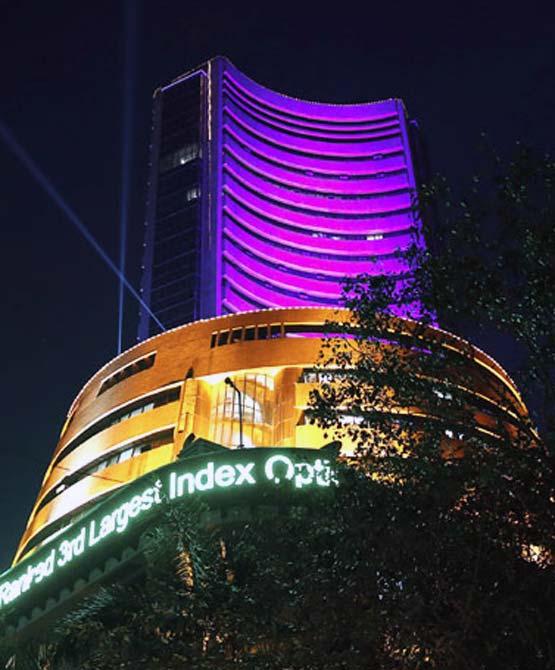
India looks good in an emerging market context and flows into emerging markets have turned positive, says Akash Prakash.
The Indian equity markets are on a roll. The Nifty index is up about eight per cent in local currency and 11 per cent in dollar terms.
India is the second best-performing market in Asia, after Indonesia, and one of the best emerging markets overall.
We have received inflows of about $4 billion from foreign institutional investors (FIIs) in the first quarter of 2014, of which $2.5 billion have come in the last two weeks of the quarter.
The indices are recording new highs on a daily basis, and, after a long time, India is once again a discussion point for global investors.
While domestic investors have still not joined this rally, the continued redemptions that accompanied every market rise till now seem to have finally stopped.
…
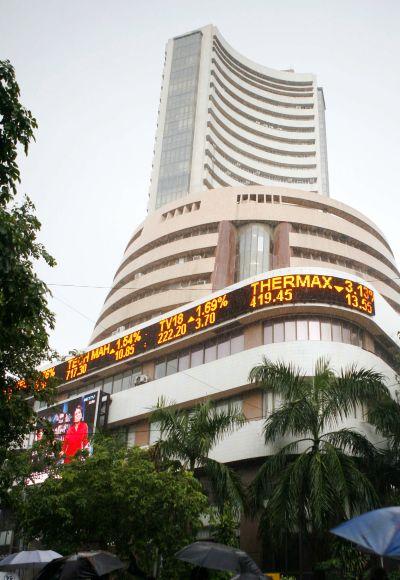
How do you revive investment when the majority of India's infrastructure developers are over-leveraged and have no access to equity? Who will fund India's growth when public sector banks (which account for 70 per cent of the Indian banking system) need $40 billion of equity, and the government does not have the money?
The fisc is under serious stress and the United Progressive Alliance has left behind a legacy of rights and entitlements that will be impossible to rescind. Unless the National Democratic Alliance (NDA) wins a near-majority, how will it get anything through Parliament?
There seems to be little chance of the creation of a grand alliance to push reforms like the goods and services tax and the direct taxes code. The private-public partnership model for infrastructure development is broken.
So, given the limited fiscal space available to the government, how will India build its infrastructure?
…

According to this camp, even two years from now, we will be lucky to see gross domestic product (GDP) growth at anything beyond six per cent.
The days of nine per cent growth were a mirage, brought about by a global economy firing on all cylinders, and the tailwinds of significant reforms undertaken in 2002-04.
The NDA, if it comes to power, is inheriting an economy with deep structural challenges, none of which can be overcome in the short term.
So why are investors buying? Do they see something different from the above? The cynics will argue that this is nothing but momentum investing in all its glory.
…
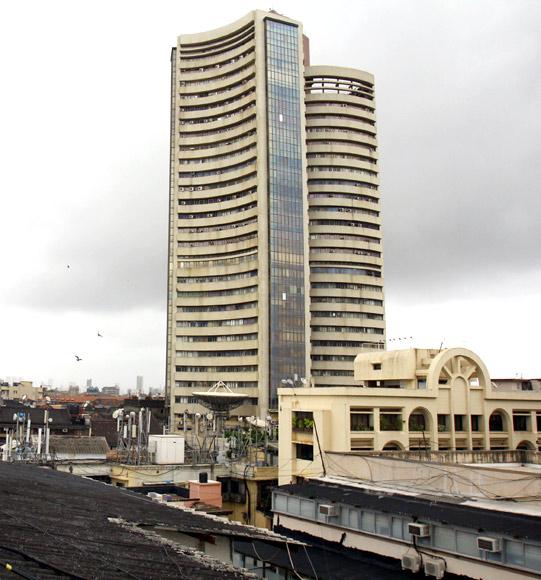
According to this camp, even two years from now, we will be lucky to see gross domestic product (GDP) growth at anything beyond six per cent.
The days of nine per cent growth were a mirage, brought about by a global economy firing on all cylinders, and the tailwinds of significant reforms undertaken in 2002-04.
The NDA, if it comes to power, is inheriting an economy with deep structural challenges, none of which can be overcome in the short term.
So why are investors buying? Do they see something different from the above? The cynics will argue that this is nothing but momentum investing in all its glory.
…

India looks good in an emerging market context and flows into emerging markets have turned positive. Just look at the sectoral composition of this rally: it is led by capital goods, public sector banks and anything that has economic sensitivity.
Most information technology stocks are actually down for the year. The markets are signalling that growth has bottomed.
But the reality is that, despite the new highs, the Indian markets on an absolute basis are not over the top in terms of valuation.
The markets are trading at about 14 or 15 times 2014-15 earnings, in line with the long-term average of 15 times.
The valuation premium to broad emerging market averages is high, at over 40 per cent.
…
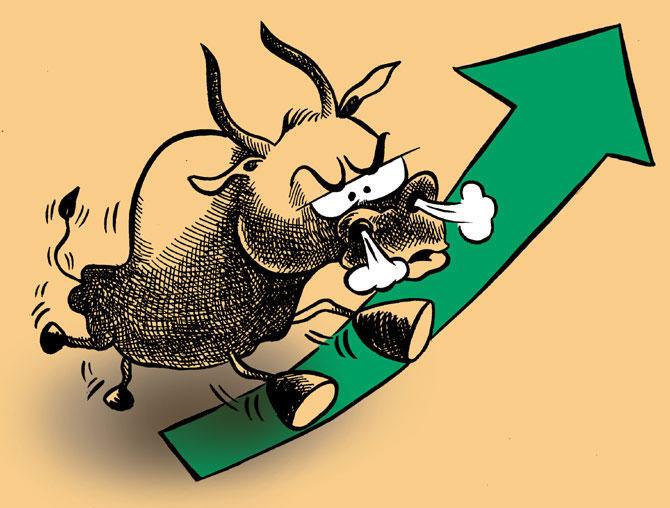
This, however, reflects the poor outlook for most of the large emerging market countries and the fact that India is far closer to the end of its growth slowdown.
Valuation multiples are also far below average, if one were to look at smaller companies and move beyond the top 50 stocks.
If one were to look at market capitalisation/GDP, at 66 per cent, India is just below its long-term average of 69 per cent and way below the peak of 103 per cent.
…
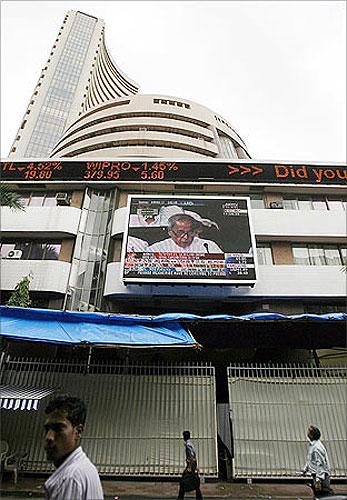
From January 2008, Indian equities have delivered only one per cent compounded annual growth rate, or CAGR (in rupees, negative in dollars), so we are coming off a six-year consolidation phase.
The valuation multiples are also based on below-trend earnings.
According to Motilal Oswal, corporate profits as a percentage of GDP, at about four per cent today, are significantly below the decade's average of 5.6 per cent and the peak in 2007-08 of 7.8 per cent.
…
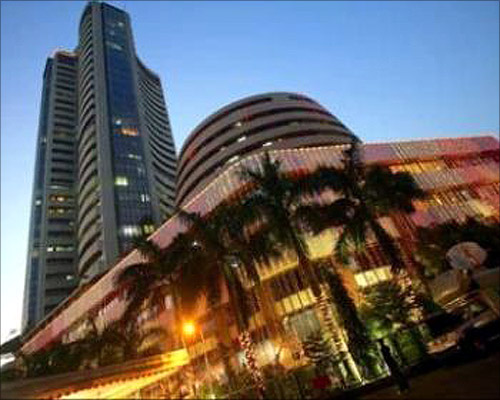
If one were to assume that we get nominal GDP growth of 13 or 14 per cent over the coming years and profits normalise to their long-term average over a five-year period (though it should happen faster), we can underwrite 21 to 23 per cent earnings growth for the broad market.
This will be one of the fastest five-year earnings CAGR in the emerging market world.
According to Ambit, it is obvious that elections have an impact on the markets - for the last eight elections over 30 years, in the two years after the elections, markets have given a positive return seven out of eight times (and the average return is CAGR of 27 per cent for two years). Investors have high hopes that this pattern will repeat itself.
…
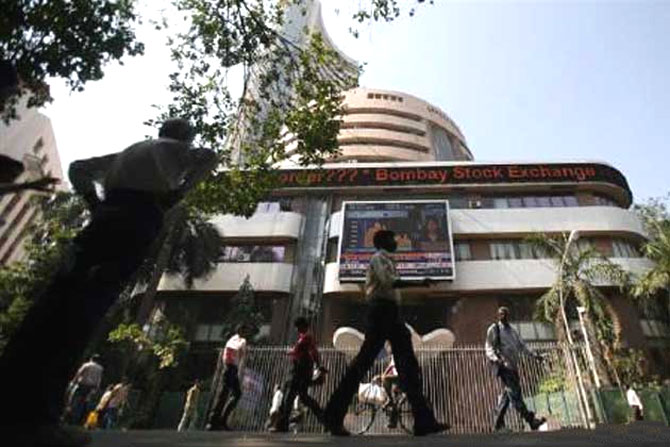
This election is critically important, because most investors are looking for a reset of economic policy. Most FIIs feel that the country has lurched too much to the left in its economic orientation.
Business and profit have once again become bad words in India, and the state is seen as the solution to every problem. India is today one of the toughest places to do business in the world. The tax, legal and regulatory environments are downright hostile.
Investors are looking for a government that will once again unleash the economic and entrepreneurial energy of the country, and make India an easier place in which to do business.
…

A prime minister who understands that less government and more governing are the need of the hour is what investors want. India needs radical administrative reform of the type that only an outsider to Delhi can deliver.
This rally is not all about momentum and short-term capital flows. Investors do not expect an immediate recovery to eight or nine per cent GDP growth. Most are willing to look through the poor short-term numbers.
What they do expect is better governance and a better balance between economics and populism. As long as whoever comes to power signals that India is open for business and no longer complacent about growth - and that the new government will continue to support the RBI - they will be given the time and space by investors to rebuild the India growth story.
Everyone recognises that our problems are largely self-created, and only we can solve them. All we need is the political will to do so